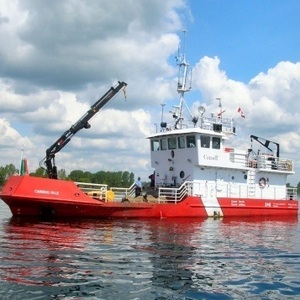Canadian Coast Guard trials B20 blend

SOURCE: Candian Coast Guard
October 11, 2022
BY Canadian Coast Guard
Reducing carbon emissions is one of the most important ways Canada and Canadians can fight against climate change. In line with the Government of Canada's 2030 and 2050 commitments to reducing greenhouse gas emissions, the Canadian Coast Guard (CCG) is pursuing tangible decarbonization efforts. On Oct. 4, CCG announced important steps in reducing its emission output: the start of a biodiesel testing project and the launch of the next phase in the construction of the Government of Canada's first hybrid electric vessel.
Earlier this month, following the award of a contract to procure biodiesel from Windsor, Ontario based Sterling Fuels, CCG broke historic ground for the Government of Canada, becoming the first government agency to trial a 20 percent biodiesel blend in one of its vessels, the CCGS Caribou Isle. Over the next months, various biodiesel ratios will be tested in order to enable the CCG to assess operational feasibility and technological compatibility of higher blend rates across various operational settings. This biodiesel test project will assist in advancing solutions to decrease emissions in the immediate term.
In addition to testing greener fuels, the CCG is preparing for construction of a new hybrid electric Near-Shore Fishery Research Vessel to reduces consumption of diesel. Following the design and engineering work for a vessel class fitted with a battery energy storage system, the CCG has issued a request for proposal to Canadian shipbuilders to start construction of one vessel.
Advertisement
Advertisement
The successful bidder will incorporate Canadian innovative green technologies in the construction of the vessel. These include the overall design by British Columbia vessel designer Robert Allan Ltd, a propulsion and battery system by Prince Edward Island engineering firm Aspin Kemp and Associates, and deck equipment systems engineering by Nova Scotia's Hawboldt Industries Ltd.
Canadian shipbuilders are welcome to learn more about this opportunity, by visiting the NSFRV Build Request for Proposal on CanadaBuys.
Through these two important projects, the CCG is taking a major step in the overall objective of lowering our fleet's carbon emissions. Over time, the CCG looks forward to continuing this important work in partnership with leading Canadian green industries.
Advertisement
Advertisement
"The Canadian Coast Guard is taking significant steps in reducing its carbon footprint with these two initiatives. I'm looking forward to expanding these green initiatives, which will chart a positive course toward a cleaner, low-carbon environment from coast-to-coast-to-coast,” said The Honourable Joyce Murray, Minister of Fisheries, Oceans and the Canadian Coast Guard.
"This new electric hybrid powered vessel and the use of biodiesel in our fleet have the potential to become a watershed moment in future shipbuilding and green fuel use,” said Mario Pelletier, Commissioner, Canadian Coast Guard. “These initiatives gives us reasons to be proud and to be hopeful. Congratulations to all Canadian Coast Guard personnel and project stakeholders on achieving these latest milestones."
Related Stories
Calumet Inc. on Aug. 8 confirmed its Montana Renewables biorefinery is currently running at full capacity. An initial phase of the company’s MaxSAF initiative remains on track to boost SAF capacity to up to 150 MMgy by mid-2026.
Marathon Petroleum Corp. on Aug. 5 released second quarter financial results, reporting improved EBITDA for its renewable diesel segment. The company primarily attributed the improvement to increased utilization and higher margins.
Chevron Corp. on Aug. 1 confirmed the company started production at the Geismar renewable diesel plant in Louisiana during the second quarter after completing work to expand plant capacity from 7,000 to 22,000 barrels per day.
California’s new specified source feedstock attestation requirement: A critical new compliance step for renewable fuel producers
As of July 2025, California’s SCFS requires renewable fuel producers using specified source feedstocks to secure attestation letters reaching back to the point of origin. This marks a significant shift in compliance expectations.
The public comment period on the U.S. EPA’s proposed rule to set 2026 and 2027 RFS RVOs and revise RFS regulations closed Aug. 8. Biofuel groups have largely expressed support for the proposal but also outlined several ways to improve the rulemaking.
Upcoming Events










